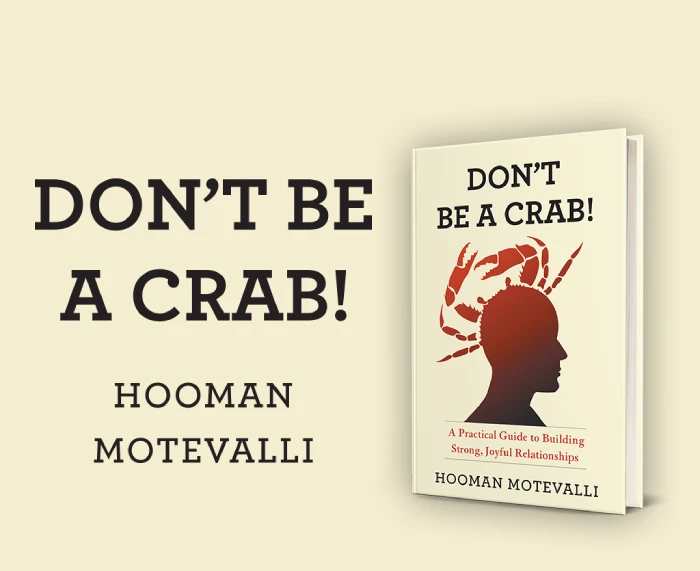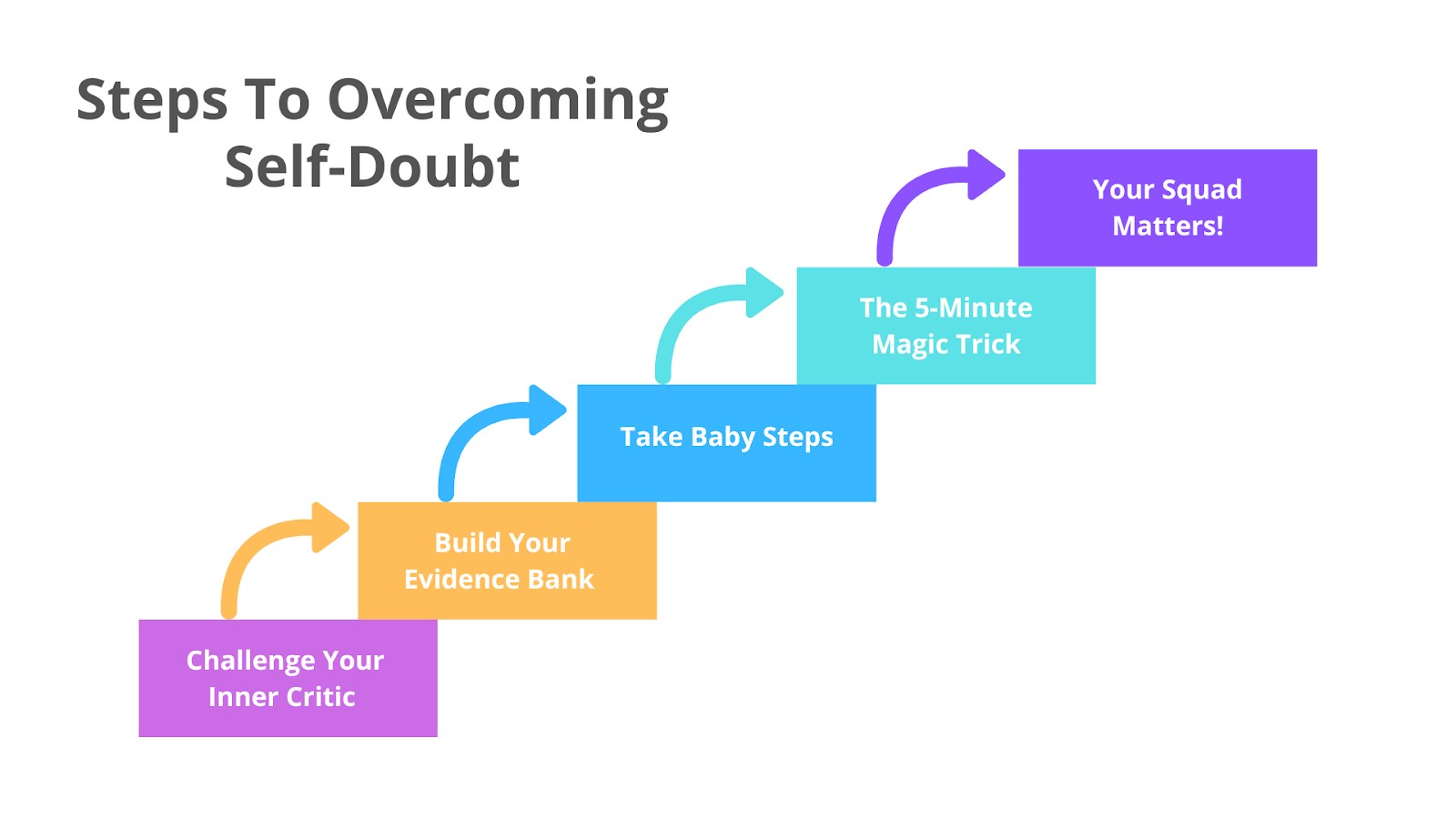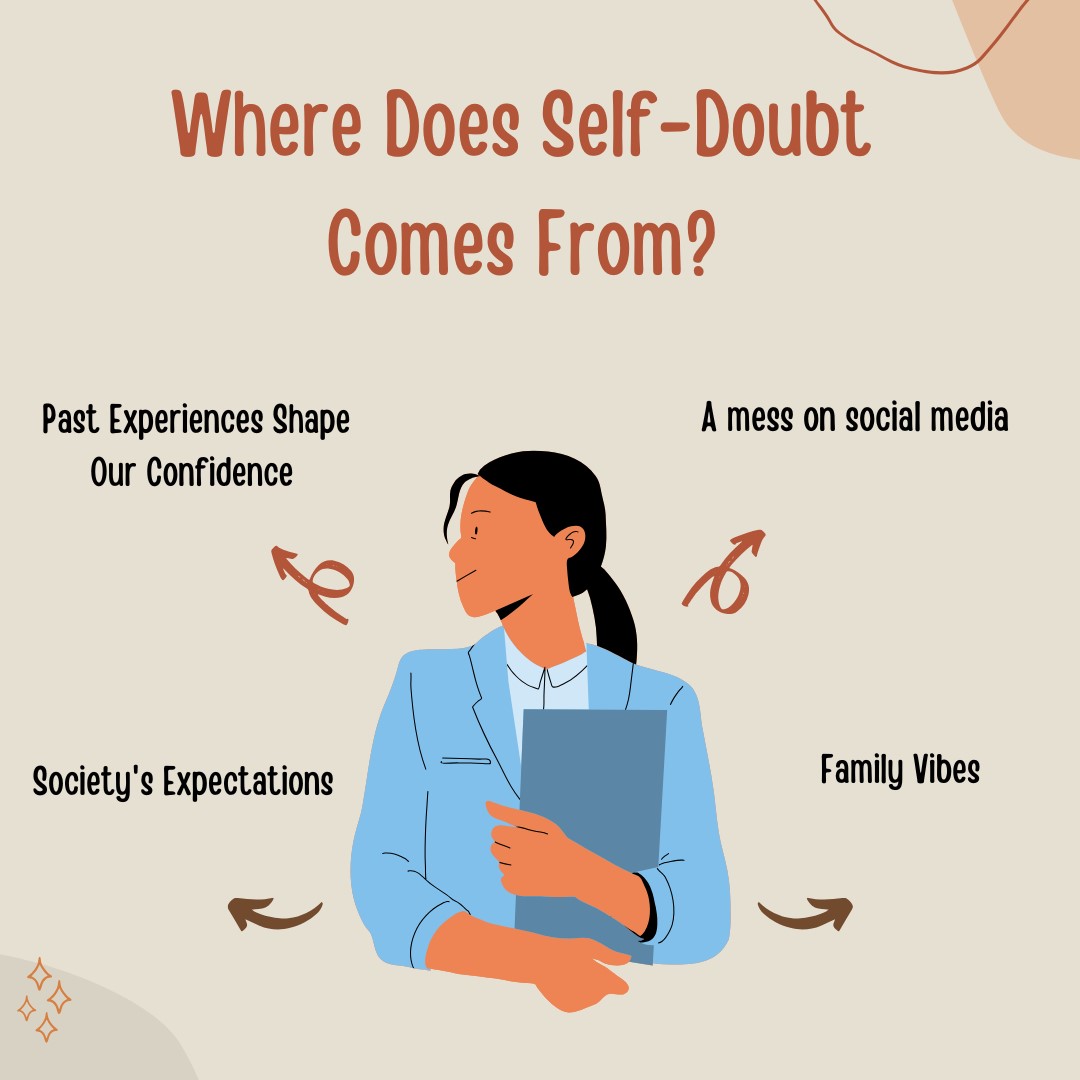“What if I mess everything up?” or “I’m not cut out for this” are some thoughts you may have had. All of us, from CEOs to students to artists, have those annoying questions from time to time.
When we’re about to do something new or important, self-doubt pops up out of nowhere and makes us doubt our skills, even if we’ve done well in the past. In fact, about 70% of people have felt like they were pretending to be someone else at some point. But there is good news: self-doubt doesn’t have to stop you forever.
If you want to get past your doubts and feel more confident, we will show you how. There’s no fancy language or hard-to-understand ideas here, just simple plans that work in the real world.
What is Self-Doubt?
That voice in your head that tells you you’re not good enough is self-doubt. It shows up when you want to try something new, when you have a work talk coming up, or even when you’re doing a great job. This voice makes you doubt your skills and worth, even when you have a lot of proof that you can do well.
Not just CEOs but also artists, sports, teachers, and students have self-doubt. Before a big job interview, you may have asked yourself, “Do I really have what it takes?” Or being afraid of messing up a new job when you start it. Studies indicate that approximately 70% of individuals encounter imposter syndrome at some point.
This high percentage isn’t a surprise because imposter syndrome—the constant feeling that you’re a fraud despite your successes—is a close friend of self-doubt. It makes you question your success and think it was luck instead of your real skills and hard work.
Research shows that how we think about ability matters. Experts discovered that individuals with what is known as an “incremental mindset” are better able to deal with self-doubt than those who believe skills are fixed. Self-doubt isn’t as bad when you think you can get better; it doesn’t make you as nervous or hurt your performance as much. If you want to deal with self-doubt better, you might want to change how you think about your skills.
How Self-Doubt Affects Us?
Self-doubt changes how we act in significant ways. When that doubtful voice kicks in, it creates real ripples in our daily lives. Let’s break down exactly how it shows up:
Effects on Work and Career
- Job Hunting: People skip applying for jobs they’re qualified for because they doubt their skills. A LinkedIn survey found that 60% of women won’t apply for a job unless they meet 100% of the requirements, while men apply when meeting just 60%.
- Performance: The quality of our job may decrease when we question ourselves. We check everything twice, waste time looking for approval, or rush through jobs to avoid being judged.
- Leadership: Those who question themselves don’t want to take jobs or speak up in meetings. Some people may put in extra hours to show their worth, which can lead to burnout.
Personal Life Impact
- Relationships: Self-doubt puts up barriers. Feelings of not being worthy may make you avoid dating, keep bonds on the surface, or find it hard to trust your partner.
- Making choices: What seems like simple options become big problems. When you don’t trust your senses, choosing a place for dinner or a new room can be challenging.
- Bad Health Habits: Many people don’t go to the gym because they think it will make them look bad. They may not go to the doctor because they fear being judged for their health problems.
Social Situations
- Speech in public: Many people miss chances to share their thoughts or speak at events. “Public Speaking Anxiety Statistics 2023” research shows that 75% of people have trouble speaking publicly.
- Group Settings: When people question their abilities, they hold back in talks with others or avoid going to social events altogether. They may reject offers or leave early because they fear they won’t fit in.
Steps To Overcoming Self-Doubt
Here’s a clear, actionable guide to overcoming self-doubt:
1. Challenge Your Inner Critic
According to clinical research by Stanford University, self-doubt thoughts are not based on facts. Your brain often makes up stories about what could go wrong. Start catching these thoughts and question them. Are they real, or just fears?
Steps to practice:
- Write down your self-doubting thoughts
- Ask: “What proof do I have that this is true?”
- Look for times when the opposite was true
- Replace with realistic thoughts based on facts
2. Build Your Evidence Bank
Harvard’s Psychology Department research shows that writing down our daily wins, no matter how small, makes us feel better about ourselves and motivates us to do better at work. You can feel more confident when your inner critic comes out by writing down all the things you’ve done well, like delivering a great talk or helping a coworker.
Daily practice include:
- Keep a “wins journal” – big and small victories
- Save positive feedback from others
- Take photos of completed projects
- Review your evidence bank weekly
3. Scared to Get Started? Take Baby Steps
Sometimes, we all get stuck! You don’t have to do anything big to get rid of self-doubt. Do one small, brave thing every day. For example, say something in a meeting that you normally don’t, or send a message to someone you think is great. Soon, you’ll be crushing it!
Quick wins to get you going:
- Drop that idea in your next meeting
- Reach out to someone who inspires you
- Switch up your routine with something new
- Use your voice when you’d normally stay quiet
4. The 5-Minute Magic Trick
Are you trying to avoid something? Just wait 5 minutes for this very easy hack to work. Most people keep going once they get into the zone, but if you stop after 5, that’s still progress!
Make it happen:
- Set that timer (yep, just 5 mins!)
- Jump into whatever you’ve been dodging.
- Give yourself permission to stop after 5
- Watch how often you actually keep rolling
5. Your Squad Matters!
To be honest, having great people around you makes all the difference. Those annoying worries don’t stand a chance when people are rooting for you!
Build your dream team:
- Hook up with positive peeps at work
- Get into groups where people get you
- Find someone who’s been there, done that
- Tell your friends what you’re working toward
- Keep in touch with your supporters regularly
Want a simple start? Pick one strategy and try it for a week. Notice what changes. Then add another. Small steps create big shifts over time.
Where Does Self-Doubt Come From?
It’s not all in your head; there’s a scientific reason for this. Here are all the reasons:
Past Experiences Shape Our Confidence
Those tough moments from your past? They leave a mark. Research from Lawson et al. (2022) in the Journal of Personality and Social Psychology shows that early emotional patterns and our ability to control responses significantly influence later mental well-being and self-perception. Did you fail that important test years ago?
Did you get criticized for a presentation? Your brain remembers these moments and uses them as reference points. But here’s the good news – understanding these patterns helps break their power.
Chapter 2 of “DON’T BE A CRAB!” makes this point very clear. That inner voice says you’re not good enough? That’s exactly what the book calls it: your mental “Roommate.” Self-doubt is that annoying voice that comes from bad memories of making mistakes or being scolded.
The book really gets it right: those old, bad thoughts try to hold us back every time we try to grow or try something new. It’s crazy how our brains take other people’s opinions and turn them into our own, don’t you think? There’s also evidence that these thoughts aren’t just random; they shape how we feel about ourselves and deal with tough conditions.
A mess on social media
In all honesty, it feels different to read through those perfect posts. A half-hour on social media makes most of us feel a lot less great about ourselves. Look at it this way: we’re seeing everyone’s highlight reel, with their best moments, best pictures, and biggest wins. At the same time, we’re facing real life while sitting there in our pajamas. It’s no wonder our trust drops!
Society’s Expectations
The way you dress, your relationships, and your job are all governed by society’s unspoken rules of what success looks like. These unclear standards make us think about whether we’re doing or being enough. If these pre-made standards don’t fit us? That’s when doubt in yourself loves to show up.
Family Vibes
How did your family deal with success, loss, and mistakes when you were growing up? That stuff stays put! You may still hear the words “You could’ve done better” or “Why can’t you be more successful” if you heard them as a child. How your family dealt with successes and failures has a huge impact on how you see yourself now.
5 Ways to Build Self-Confidence Through Action
Looking for ways to increase your confidence? Since actual conversation and action always outperform doubt, here are seven really doable, no-nonsense techniques to increase your self-confidence by acting!
1- Start Daily Mini-Challenges
Every morning, set small goals that you can reach and go after them. Huang, Etkin, and Jin (2017) published a study in the Journal of Personality and Social Psychology that says early wins in a process make people much more motivated when they think they can reach their goals. This is why it’s important to start with small wins.
Have a talk coming up next week? Do some speaking practice today for two minutes in front of a mirror. Are you scared of the gym? Come in, do one practice, and then leave. Small wins like these add up quickly.
Your brain starts to realise that you can push through pain when you do these little tasks over and over again. You can use your phone to remember you, keep a log to record your progress and enjoy every small win, even if it’s just a mental high-five.
2- Learn One Thing at a Time
Pick a subject you want to learn more about and divide it into manageable chunks. Want to learn how to code? Do some simple HTML every day for 15 minutes at first. Are you interested in cooking? Master scrambled eggs before tackling more difficult recipes.
Spend at least 21 days working on this one skill. Use pictures or notes to keep track of your progress. Join online groups that are all about the same skill. This is important: keep your mind on one thing until you’re sure you can do it. Your confidence will easily rise as your skills improve.
3- Accept the “Just Show Up” Way of Thinking
Just showing up is half the battle. Do you have a networking event? Enter the doorway. Are you thinking about joining a group? Go to one meeting. No need to push yourself to be great or even perfect; just be there.
Make it a rule to be there for 10 minutes. You can leave if you’re still not comfortable after that. Sometimes, you’ll stay longer because what you thought would happen was worse than it was.
4- Replace your “to-do” list with a “done list.”
Writing down everything you do every day, no matter how small, is important. According to Wolfson and Mathieu’s 2018 study in the Journal of Applied Psychology, supporting teams and praising each person’s successes in their own unique situations greatly improves performance.
Did you send that scary email? Note it down. Made that call you’ve been putting off? Put it on the list. Look over this list once a week to keep track of your progress. You can also keep track of your accomplishments in a special notebook or digital app.
5- Put together a “Confidence Wardrobe.”
Pick out clothes and items that make you feel strong and certain of yourself. What clothes give you extra energy? Keep those outfits on hand for days when things get tough. Make a basic outfit that you can wear in many scenarios.
Find your best outfits and take pictures of them to help you remember what works. Organize and clean your closet often. Your stance simply gets better when you feel good in your clothes, and you seem more confident. There’s no need to buy new things; the goal is to find and use what makes you feel strong already.
If you’re ready to take full control of your thoughts and move from confusion to clarity, this guide on how to believe in yourself offers five self-esteem exercises helps you boost your confidence and take the next step forward.
Conclusion: Your Path Forward
It’s not hard to boost your confidence. Self-doubt is something that almost everyone has, but only those who do something about it see real results. Need proof? People’s confidence goes through the roof when they start keeping track of their wins. They have great success when they take on small tasks. What about that 5-second rule? It always gets rid of worry.
Not only are these ideas nice, but they’ve also been shown to work in the past. The bottom line is this: start with something that seems doable to you. Writing down your daily wins or just being there when you’d rather be hiding could be it. Pick one thing. Do it for a week. Look at what goes on.









